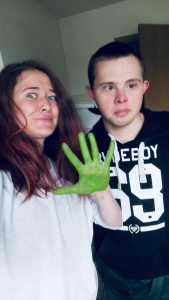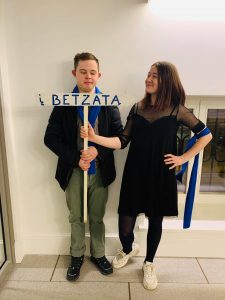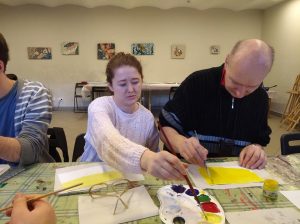 Eugenia iš Rumunijos turėjo ESK galimybę 11 mėnesių patirti bendrystę su neįgaliaisiais savo projekte Betzatos bendruomenės gyvenimo namuose. Norime pasidalinti jos įspūdžiai iš savo savanorystės kelionės Lietuvoje – tarp Vilniaus ir Čekoniškių kaimo.
Eugenia iš Rumunijos turėjo ESK galimybę 11 mėnesių patirti bendrystę su neįgaliaisiais savo projekte Betzatos bendruomenės gyvenimo namuose. Norime pasidalinti jos įspūdžiai iš savo savanorystės kelionės Lietuvoje – tarp Vilniaus ir Čekoniškių kaimo.
For a long time I wanted to do a volunteering project abroad, but I never seemed to find the right moment, there was always something more important on my “to do list”.
It might sound cheesy, but this ESC project totally changed my life, and soon you will understand why. The first question that I always get from friends, other volunteers, my colleagues or different people that I meet is “Why did you choose this project?”. My answer is always the same “The project chose me”. A few years ago, when I first heard about this type of projects I subscribed to a Romanian organization called Tinerii 3D for receiving information regarding open calls for projects, but I never applied to any of those.
This changed last February when I decided to apply for a project here in Lithuania. I was at a point in my life when I felt the need for a break, but a productive break. Don’t get confused, this is not a paid holiday, you have to work hard, but it totally pays off. I am one of the lucky volunteers because I live in Vilnius, the capital of Lithuania. Lucky because I have plenty of things to do on my free time in this amazing city compared to other friends who volunteer in small cities.
My home is in the city, but my work is in a small village called Čekoniškės. I volunteer for Betzatos Bendruomenė, a community where assistants and people with mental disabilities live together, sharing daily life. If I had to choose a single word to describe this place I would choose family. It has both easy and challenging parts. There are happy days and hard days. Working with people with mental disabilities is not an easy job, it requires a lot of patience, communication skills, social skills and when you are in a foreign country language skills. Ok, but what to do when you don’t speak the national language, when your colleagues or your target group don’t speak English either? Well, you manage your own way to deal with that. Using signs, sounds, playing, drawing, giving up. The last one it’s actually not an option since the main purpose of this community is to involve the people with disabilities, or as we call them core members, in all the activities. One of my favourite methods to learn new words in Lithuanian or to say something was to get the help of one of the core members who can say some things in English. So, when I was struggling with one word I was almost always going to this particular core member, telling how you can say that in English and asking how I can say it in Lithuanian.
My first days in the community were at the same time the best and the most challenging. I started my project in April, with beautiful weather, beautiful nature and happy people. Playing basketball almost every day with the youngest boy from the community who never seemed to get tired, we might have the same age, but not the same energy. What got stocked the most in my memory was the first time when I had to cook. I was used to do that for myself, but when I had to cook for around 10 people, I totally panicked. I remember that the entire time I was afraid that it’s not good, not enough, not Lithuanian food, while everybody around was very calm and positive. I think I was somehow angry that they didn’t worry as much as I did. I said this little story with the food so you can understand some of the feelings that one can experience during this type of projects.
Volunteers will struggle a lot of times with the fear that they are not doing things well enough, that they are not being helpful or needed in that place. It’s not available for all the volunteers, but mostly for those whose projects are in schools, kindergartens or communities like mine. These type of places don’t usually give volunteers specific tasks. They will let you to find your own place or the activities you want to do. It won’t be the easiest thing to do when you are the only new person in a group where everybody seems to know their rolls.
I remember that it took me quite a while to understand this.
Leaving with people with mental disabilities it totally made me see a lot of things different. I remember that in the beginning I was seeing them as entire entity, but day by day I learned how different they are, how different they think, and express their feelings. I understood that I can create friendships with some of them and not with others, which is totally normal. I saw that some received me in their house as a friend from day one, while others still don’t understand why this weird Romanian girl who doesn’t speak Lithuanian and doesn’t eat šaltibarščiai is here. Now that after more than helf of my project it’s gone I realized that all of this is normal. These people might have their disabilities, but it doesn’t mean that they don’t realize what is happening around them. That they can’t choose who to like or with who to spend their time. And so each of them put their finger print on me. It is so funny and so amazing at the same time how a man over 40 can love flowers to the point that he will want to pick them everyday for his room.
This project also gave me a lot of time to reflect on myself, to think on what I want for the future. Well, the second part only if you are responsible enough, if not you will worry about that during the last days or even last hours.
What else I gained from this project? Life friends, an amazing canoe trip, visiting Estonian and Latvian capitals, endless nights full of fun, meaningful conversations, a new country to call home and still adding. It made me realize once more that nothing is as easy as it seems, that we can learn everything while failing a lot of times.
